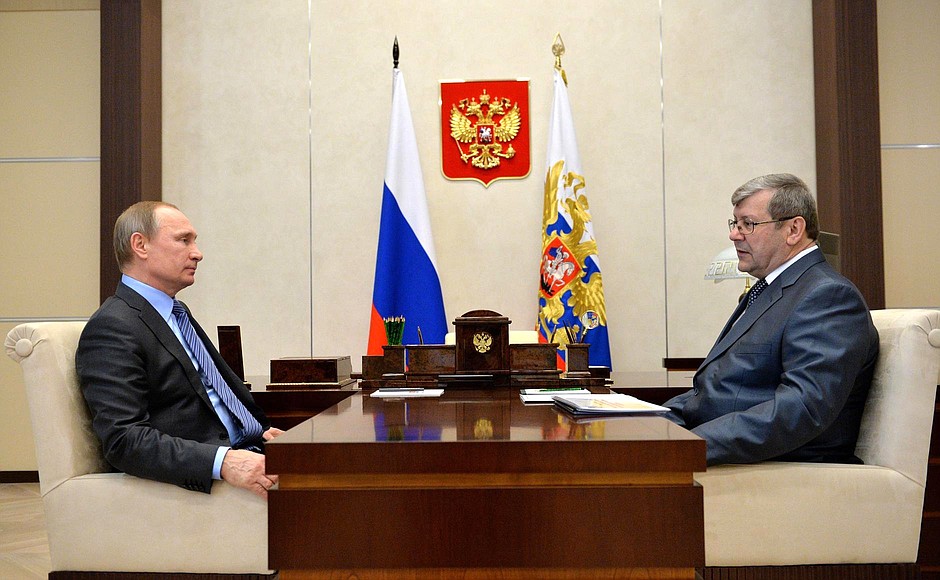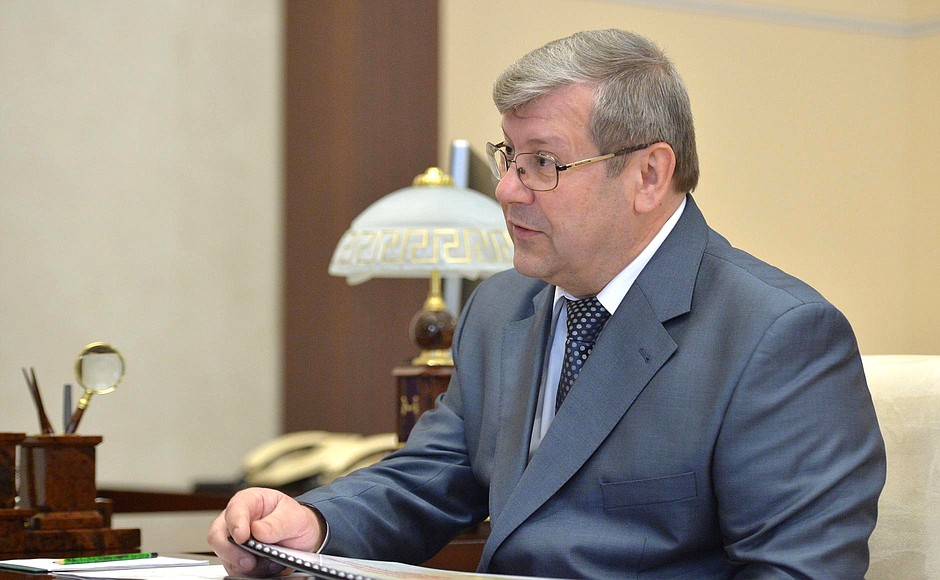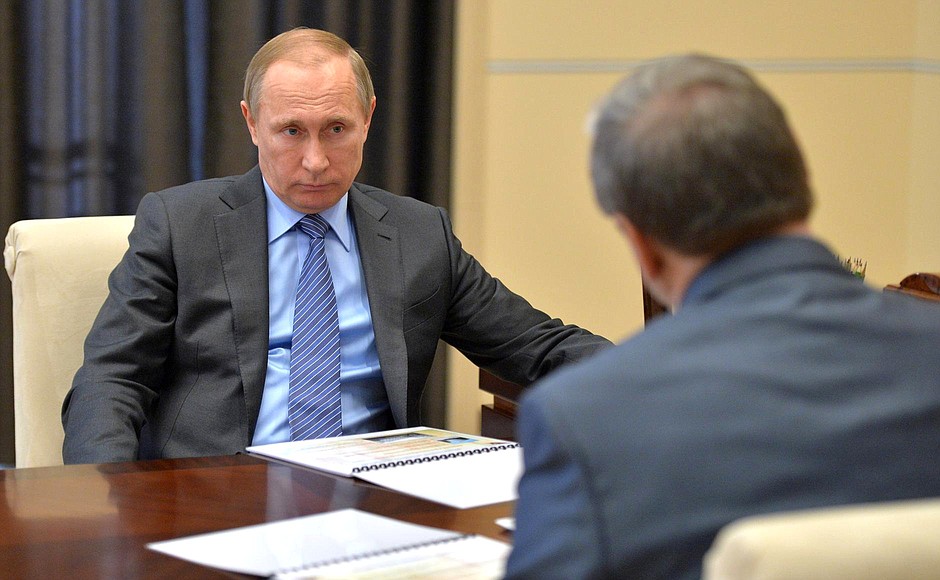The agency’s current work was the subject of discussion.
* * *
President of Russia Vladimir Putin: Mr Artizov, the materials in your agency’s possession are of particular value for the country, and it is for this reason that we have decided to bring the Federal Archive Agency under direct subordination to the President. I wanted therefore to meet with you to hear your views on the current situation and the tasks ahead, and perhaps on any problems too. Please, the floor is yours.
Head of the Federal Archive Agency Andrei Artizov: Thank you for this decision, Mr President.
See also
I met with you five years ago, in June 2011, to brief you on the situation in archival work. Changes have taken place over these five years and I can tell you that these changes have been mostly positive.
Here you can see some of the results of our work over these years (presents slides). As far as laws and regulations go, we continue developing a modern base for archival activity. You recently signed amendments to the law on archival work that will reduce the time that documents related to personal data can be kept. The aim here is to generally reduce costs for the state authorities and for business. Such documents will now be stored for 50 years, whereas before they were kept for 75 years. Fifty years is sufficient storage time given that we have modern work methods now and the Russian Pension Fund already has its own databases related to pension provision.
We just recently adopted new rules for the archives belonging to the different ministries and agencies (we already had regulations governing the work of the state archives). We now have more archivists too here in Russia, speaking objectively, as we have been joined by our colleagues from Crimea and Sevastopol. I went there a week after the reunification, met with everyone, visited all of the archives, and have been back more than once since. The archivists there are now integrated into our system and work according to our rules. We are giving them assistance. One task now is to complete the construction of the archives building in Sevastopol. It’s surprising, but this city of military glory does not have a normal archive. They began building what was, incidentally, Ukraine’s only building for housing archives somewhere around 2000, as I recall, but the project came to a halt in 2007. I hope that we and the Sevastopol city authorities will have the project completed next year and the archives will move in.
We continue developing our infrastructure. I haven’t had the chance to say it before, but let me say now that we have extraordinary figures. Over the period from 2000 to 2015, 88,000 square metres of archival space has been opened at the federal level, including in St Petersburg, Moscow Region, and in Siberia, where we also have a federal archive. Over the entire 70 years of Soviet power, only 118,000 square metres of archival space was opened. This answers the question about the kind of changes taking place in archival work.
This figure does not in fact tell the whole story either, because we now find ourselves having to modernise the archival space that was opened during the Soviet years. I was at the Literature Archive in connection with its 75th anniversary. German prisoners of war built the building in the late 1940s. The storage facilities were in a shameful state. We had to change all of the electrical wiring, install new conditioning systems and gradually modernise the facilities. This work is now more than half complete.
We are doing the same in many of the old buildings, including buildings that are historical and cultural monuments. We are consistent in this work. Of course, things have become more difficult now with the current financial and economic problems, but we are not abandoning our work.
On slide 4, you can see the new buildings we have built, including with your involvement – this concerns the historical archive.
Vladimir Putin: That’s a very solid facility we have in St Petersburg.
Andrei Artizov: It’s the best building in Europe. Here, on slide 5, you can see what has been done. We focus primarily on the fire and security alarm systems, because this is the main thing we need to ensure. We have replaced 24 kilometres of wooden shelves with metal ones over these last years.
Ahead, we have work on the cinema archive in Krasnogorsk, and this year, the current Central Committee Archives will move to Sofiyskaya Embankment, where the Presidential Property Management Directorate, with your approval, is getting everything ready for us according to our project specifications. This will mean that this archive, which comprises all the Soviet leadership’s documents from 1953 to 1993, will finally have the conditions it needs.
Our colleagues from the Foreign Ministry (I’m talking now not just about us, but also our colleagues in the other ministries and agencies, with whom we have close coordination) will soon be moving. The new Archive of the Foreign Policy of the Russian Empire on Bolshaya Serpukhovskaya will be ready for use in June or July this year.
Work continues on the Defence Ministry’s Central Archive in Podolsk. There are 20 buildings there, and some of these buildings will form the first complex, which will probably open next year to house the Great Patriotic War archives. All of the military documents relating to the Great Patriotic War will finally be all in one place. We will finally achieve this.
Vladimir Putin: What about information resources?
Andrei Artizov: We have been developing information resources in such a way that will help us do away with any myths about the secretiveness of Russian archives. You can see this on slides 8 and 9. Slide 9 is about information resources, and slide 8 is about publishing resources.
First, we have increased the floor space of our reading rooms by about 40 percent over the past few years to get rid of queues. Many people come for information to the archives and reading rooms; there is much interest in them, both on the part of Russian and foreign researchers.
Second, we have been working with virtual resources, including a virtual reading room, as an additional service, and we also post information resources on the internet. The main such resource is the Soviet Era Documents site.
We have digitalised the archives of the State Defence Committee. It was our present in honour of the 70th anniversary of Victory. We have analysed all the documents, absolutely everything, without dividing them into “good” and “bad,” but just considered everything equally. All these documents have been declassified and digitalised, and they now total nearly 300,000 images on the internet.
We have also published online the archive of the Communist International (Comintern), or 1.6 million images. We have published Politburo decisions and executive orders issued before 1934, all of them digitalised, and the largest and most interesting part of Stalin’s archive. By May 9 of this year, we will publish all resolutions of the Soviet Government, the USSR Council of People’s Commissars, adopted during the Great Patriotic War of 1941–1945. We will carry on with this project because you can’t do without this today. This is an indispensable project.
Of course, we also encountered several problems. I will speak about the biggest of them. I believe that our biggest problem is that once in the archives, a document has reached the final stage of its life. Documents are born on the desks of officials of government authorities and local governments, and then they follow their course and only the most valuable of them reach the archives.
It just so happens that we mostly deal with archives and not with the actual work and document flow, including electronic document flow, which is handy and even indispensable for reducing this huge amount of paperwork. In my opinion, we need an agency that would oversee both legal regulation and take over direct management in this sphere. At the least, this is what our colleagues do. I am referring to large countries like China and the United States. They are great archive powers.
Russia is a great archive power too. The Federal Archive Agency has 500 million dossiers on file. This huge information resource is the source of envy for many countries. Moreover, these documents deal not only with our history but also with global history, and they are not limited to Russia’s current borders because they are the heritage of the Russian Empire and the Soviet Union.
Of course, we continue to declassify documents. Some say that we keep everything secret. But only those who do not come to our reading rooms make such statements. First, we publish all declassified documents on the agency’s website, we have created a special database under a contract with the IT firm STEK. We have identified project milestones and prepared work schedules. We are better organised to declassify documents than ever before over the past decades.
We are now working on approximately 14,000 dossiers from the federal archive, and each one comprises hundreds of pages, each of which experts must read before making a decision. These dossiers are being declassified one by one in an organised manner. I can assure you that this is exactly how we are working.
Vladimir Putin: Good. The documents you need will be signed today, so good luck.
Andrei Artizov: Thank you.
<…>


